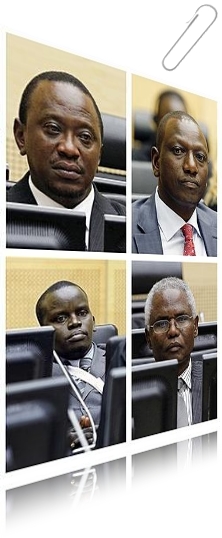The Hague: Lessons for Kenya

 |
| The Hague-4 Photo courtesy |
The verdict has been received with guarded caution among many Kenyans of all walks of life across the board. Like many Kenyans, the local and international civil society groups have welcomed the confirmation of charges by ICC and appealed for calm among Kenyans.
The ICC ruling is an important milestone in the search for justice for victims of the post-election violence. It has opened a new page in Kenya’s history. It will provide truth and reparation for those who suffered. It is important that that the law should follow its course.
It is not in doubt that the utterance of some political elite following the verdict is not in the interest of this nation, only clouded with partisan considerations. What is important is to bear in mind the fact that the four are presumed innocent till proved guilty. It is pertinent that the four now focus on their appeal devoid of politics.
Essentially, for a nation like Kenya seeking reconciliation and healing, the ruling should not be used to divide Kenyans on tribal or political affiliations. The next general election should not be intrinsically linked to the ICC process, even though to two of the suspects are potential presidential hopefuls.
This is where the nexus of the delicate aspects of the process loop in. It is important to take note of the fact that IDPs are still languishing in the camps and many families are still struggling to heal the wounds sustained during the post-election violence.
While I sympathize and empathize with the four, their families, friends and relatives, it is prudent that the four suspects prioritize the legal battle ahead of them and stop looking for imaginary enemies or individuals to blame for their predicament. Contrary to belief in certain quotas, there is no single individual with the capacity to influence the decision of the ICC.
The reaction by the Attorney General Githu Muigai has raised eyebrows among many. Immediately after the ICC verdict, President Kibaki directed the AG expeditiously set up a legal team to study the ruling by the ICC and advise the government on what action to take. The team whose mandate is not in the public domain is also said to have a brief to advise on whether the Deputy Prime Minister and Minister for Finance and the Head of Civil Services Francis Muthaura should be relieved off their duties as they prepare for the trials and appeals at The Hague based court.
When some leaders say that Kenyatta and Muthaura should not have stepped aside, this smacks the height of impunity, which the ICC process is all about. It is chest thumping that has characterized our route and journey to the The Hague, right through all our post independent regimes.
We must bear in mind that the four are innocent until proven guilty. They will have to face trial. It is up to the Prosecutor and the defense to prepare for the case. It will be hard for those aspiring for any leadership positions to vie until they are cleared by the court or even a local process as the AG alluded to transferring the cases to a local process. Regardless of the legal parameters, integrity demands that they should not.
It is not in doubt that the AG’s proposition is strange. The suggestion or contemplation to withdraw the case from The Hague is not genuine but ill-conceived. In the first instance, the formation of a legal team on the taxpayers charge is strange. First, the four individuals appeared before the ICC in their individual capacities. Not even the government was enjoined in the entire legal process. Why would the government expeditiously find it prudent to appear to want to take over the process? I wish the government could handle the IDP problem with the urgency it appears to act for the accused.
For us Kenyans, what we need now is for peace to prevail and justice to be done. Even the IDPs are Kenyan citizens in equal measure. The process is essential in ensuring we safeguard against a relapse of the events of 2007-2008.
But there are important lessons we as a nation and as a people will take from the entire ICC legal process and the subsequent verdict. First, persons who may in future contemplate or instigate violence of such nature will now have to first acknowledge that they may have to answer for their acts before an international court if a local mechanism fails.
Indeed, it is not in doubt that the ICC verdict did strike a blow against impunity. I am sure that politicians, their platitudes and sycophants will never justify politically instigated atrocities as spontaneous acts following a bungled election. More so, even as the cases proceed to full trial, ICC spelt out conditions to the suspects to ensure they keep peace.
It is clear that the verdict is haunting Parliament for persistently negating on the attempts to establish a local tribunal for the Post Election Violence. The same individuals taking a swipe at the ICC process are the very same who preferred The Hague.
It is fresh in the mind of every Kenyan that violence has no place in the community of civilized nations in the 21st century. Now, I am sure Parliament will think twice about ceding the nation’s sovereignty to other forces for lack of trust in our own institutions. Simply put, as a nation, we failed to take leadership of our destiny. We now have a second chance to take on leadership. This is a Kenyan problem. Only a Kenyan solution will suffice.
By Kasembeli Albert
The author is a Kenyan journalist based in Nairobi.
